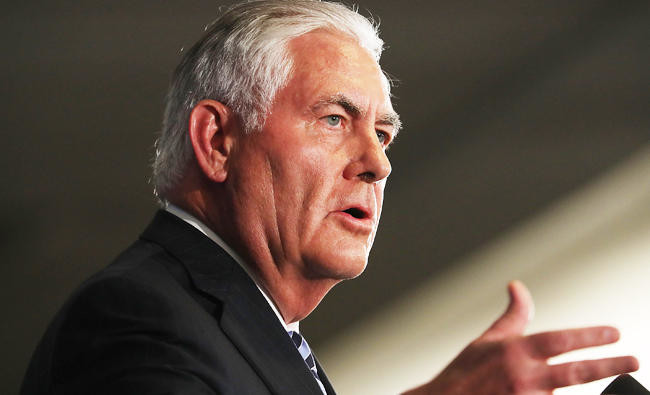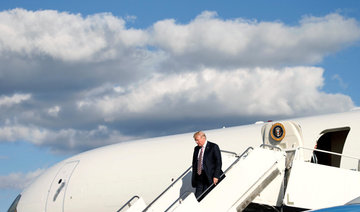BEIJING: The United States said on Saturday it was directly communicating with North Korea on its nuclear and missile programs but Pyongyang had shown no interest in dialogue.
The disclosure by US Secretary of State Rex Tillerson during a trip to China represented the first time he has spoken to such an extent about US outreach to North Korea over its pursuit of a nuclear-tipped intercontinental ballistic missile.
“We are probing so stay tuned,” Tillerson told a group of reporters in Beijing.
“We ask: ‘Would you like to talk?’ We have lines of communications to Pyongyang. We’re not in a dark situation, a blackout.”
He said that communication was happening directly and cited two or three US channels open to Pyongyang.
“We can talk to them. We do talk to them,” he said, without elaborating about which Americans were involved in those contacts or how frequent or substantive they were.
The goal of any initial dialogue would be simple: finding out directly from North Korea what it wants to discuss.
“We haven’t even gotten that far yet,” he said.
Trying to tamp down expectations, the State Department said later there were no signs Pyongyang was interested in talks.
“North Korean officials have shown no indication that they are interested in or are ready for talks regarding denuclearization,” department spokeswoman Heather Nauert said in a statement.
Tillerson previously had offered little detail about US outreach. On Sept. 20, he acknowledged only “very, very limited” contact with Pyongyang’s UN envoy.
When asked about Tillerson’s assertion and what communication there might be between Pyongyang and Washington, a spokesman for the North Korean mission to the United Nations said he “can’t go further into detail.”
OVERHEATED SITUATION
Tillerson’s remarks followed a day of meetings in Beijing, which has been alarmed by recent exchanges of war-like threats and personal insults between North Korean leader Kim Jong Un and US President Donald Trump.
“I think the whole situation’s a bit overheated right now,” Tillerson said. “I think everyone would like for it to calm down.
“Obviously it would help if North Korea would stop firing off missiles. That’d calm things down a lot.”
South Korean officials have voiced concerns that North Korea could conduct more provocative acts near the anniversary of the founding of its communist party on Oct. 10, or possibly when China holds its Communist Party Congress on Oct. 18.
North Korea is fast advancing toward its goal of developing a nuclear-tipped missile capable of hitting the US mainland. It conducted its sixth and largest nuclear test on Sept. 3 and has threatened to test a hydrogen bomb over the Pacific.
US officials including Tillerson say Beijing, after long accounting for some 90 percent of North Korea’s foreign trade, appears increasingly willing to cut ties to its neighbor’s economy by adopting UN sanctions.
Tillerson said China’s more assertive posture was due to its realization that North Korea’s nuclear and missile capabilities had advanced too far.
“I think they also have a sense that we’re beginning to run out of time and that we really have to change the dynamic,” Tillerson said.
The goal of the sanctions would be getting North Korea’s Kim to view nuclear weapons as a liability, not a strength.
Still, the US intelligence community does not believe Kim is likely to give up his weapons program willingly, regardless of sanctions.
“(Tillerson’s) working against the unified view of our intelligence agencies, which say there’s no amount of pressure that can be put on them to stop,” Senator Bob Corker told a hearing at the chamber on Thursday.
Kim sees nuclear-tipped intercontinental ballistic missiles as “his ticket to survival,” Corker said.
Tillerson agreed that Kim’s nuclear and missile programs were aimed at ensuring his own security, and renewed assurances that the United States did not seek to topple Kim’s government.
“Look, our objective is denuclearization (of North Korea),” he said. “Our objective is not to get rid of you. Our objective is not to collapse your regime.”
INCREMENTAL STEPS
It is unclear how and when any actual negotiations with Pyongyang might be possible.
White House national security adviser H.R. McMaster said on Monday there were no set preconditions for talks. He added, however, that Pyongyang’s capabilities were too far advanced to simply freeze its program in return for concessions.
He also dismissed the idea of negotiating with Pyongyang even as it continued to develop its nuclear weapons program.
Tillerson in March suggested the United States would only engage North Korea in negotiations once it gave up nuclear weapons.
But he acknowledged on Saturday that denuclearization would be an “incremental process.”
“You’d be foolish to think you’re going to sit down and say: OK, done. Nuclear weapons, gone. This is going to be a process of engagement with North Korea,” he said.
Trump, who is due to visit China in November, has called for it to do more regarding North Korea and has promised to take steps to rebalance a trade relationship that his administration says puts US businesses at a disadvantage.
Chinese President Xi Jinping did not mention North Korea in his opening remarks while meeting Tillerson on Saturday. He instead offered warm words about Trump, saying he expected the US president’s visit to be “wonderful.”
“The two of us have also maintained a good working relationship and personal friendship,” Xi said in comments in front of reporters.




























